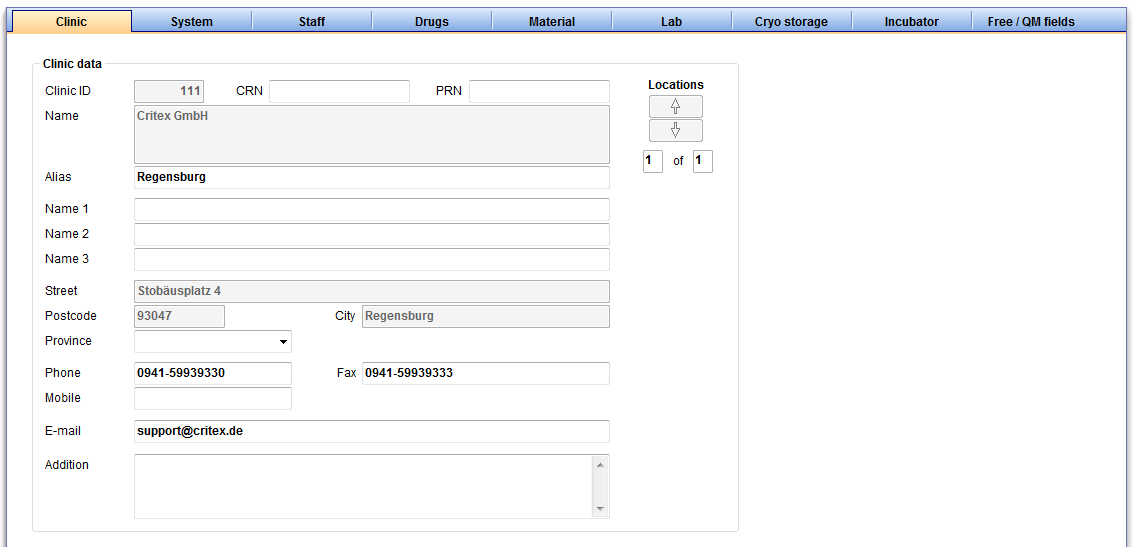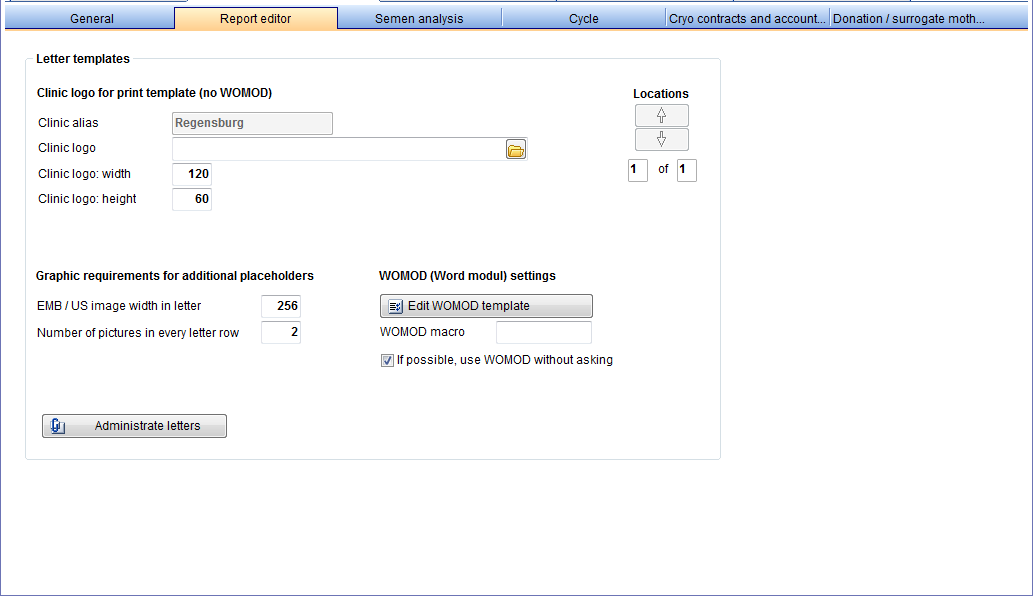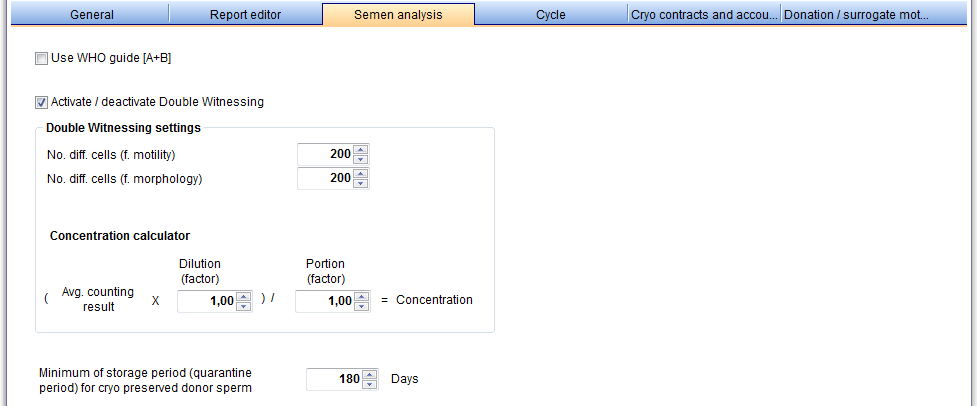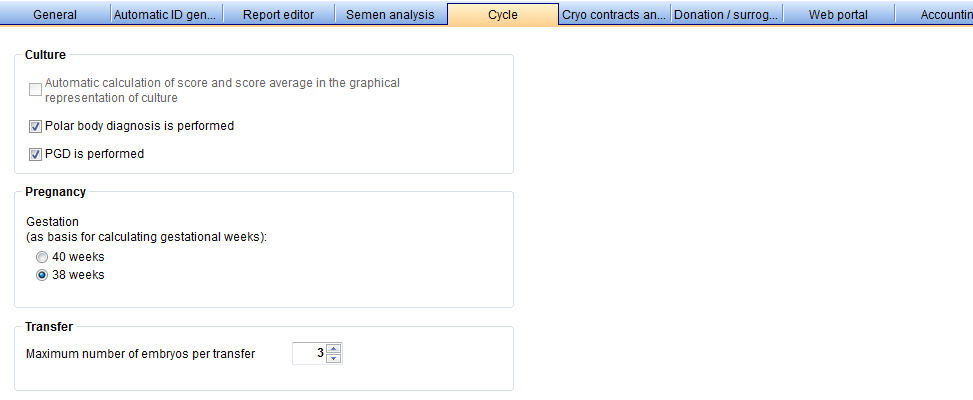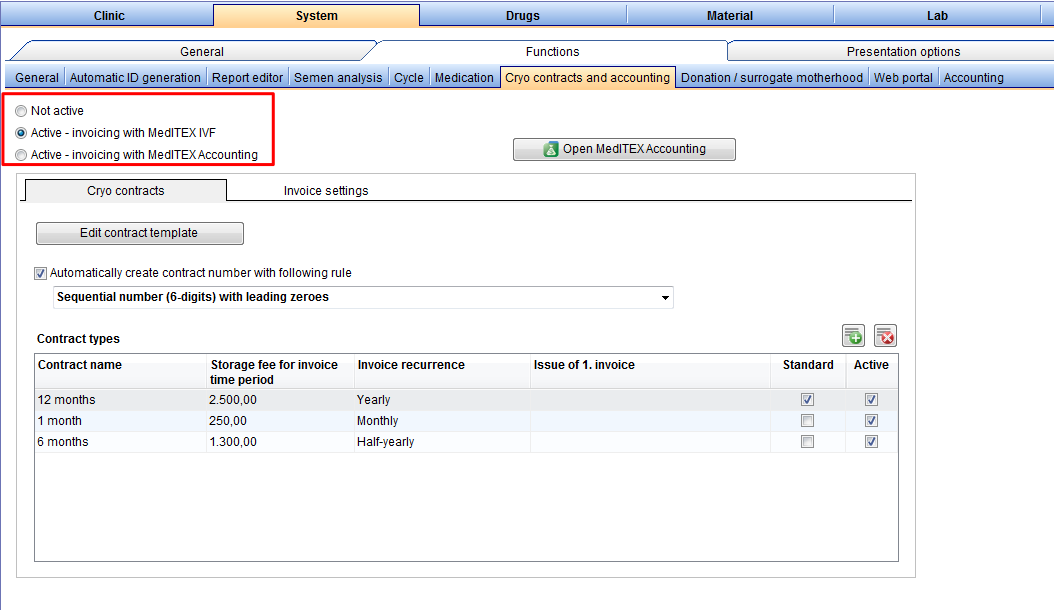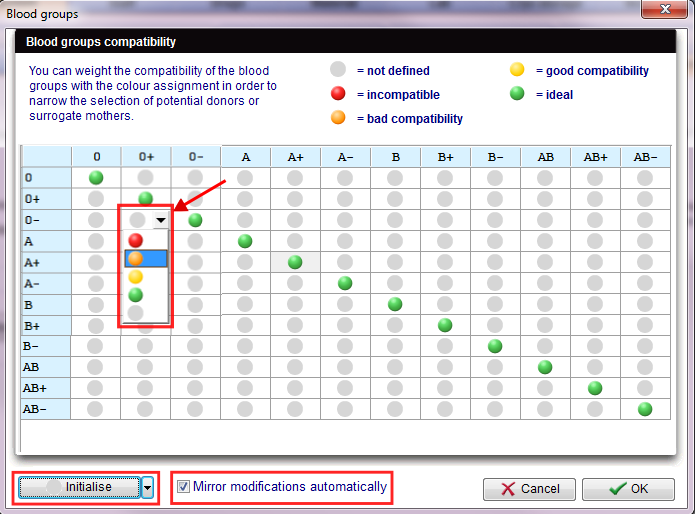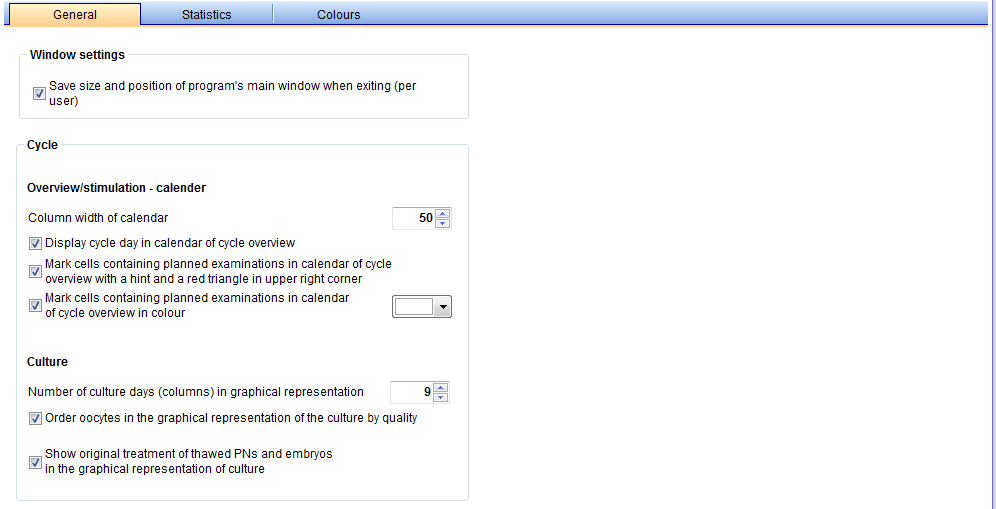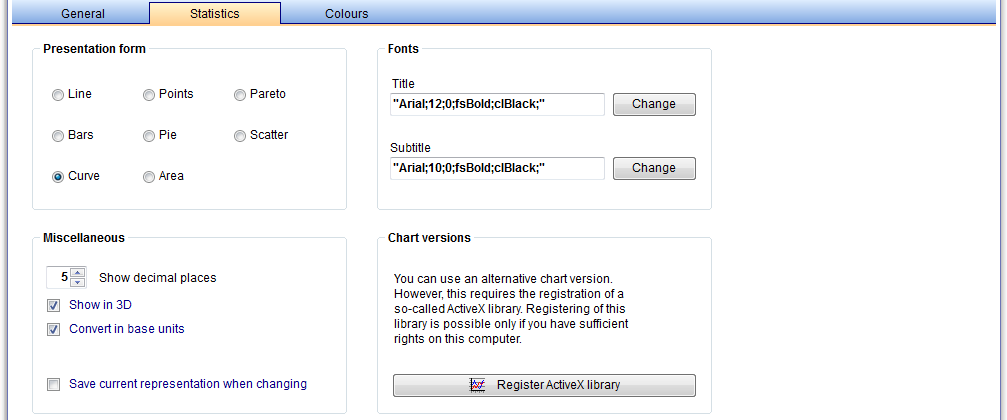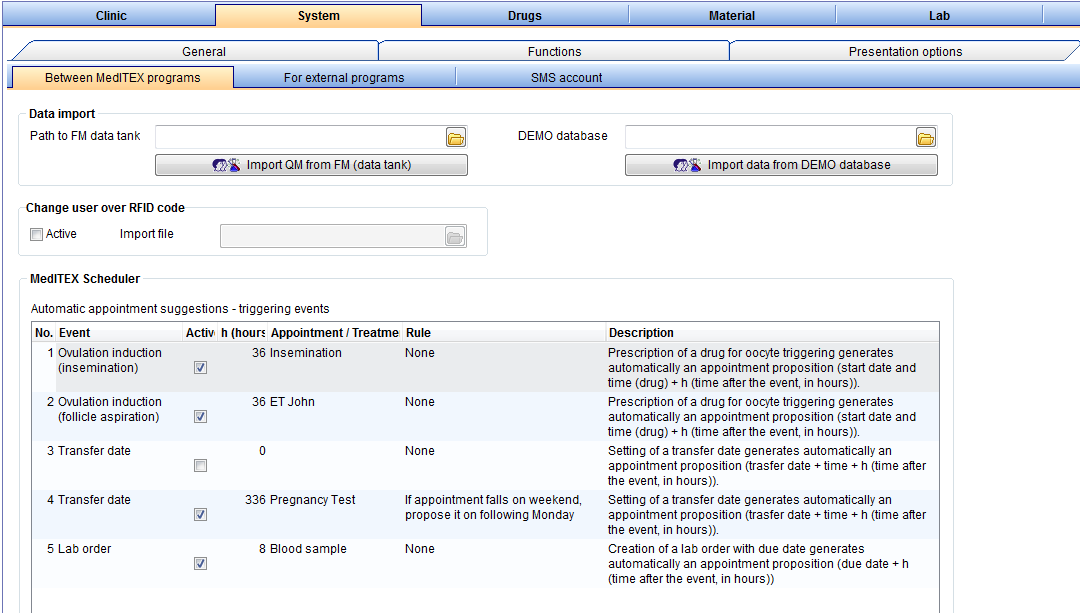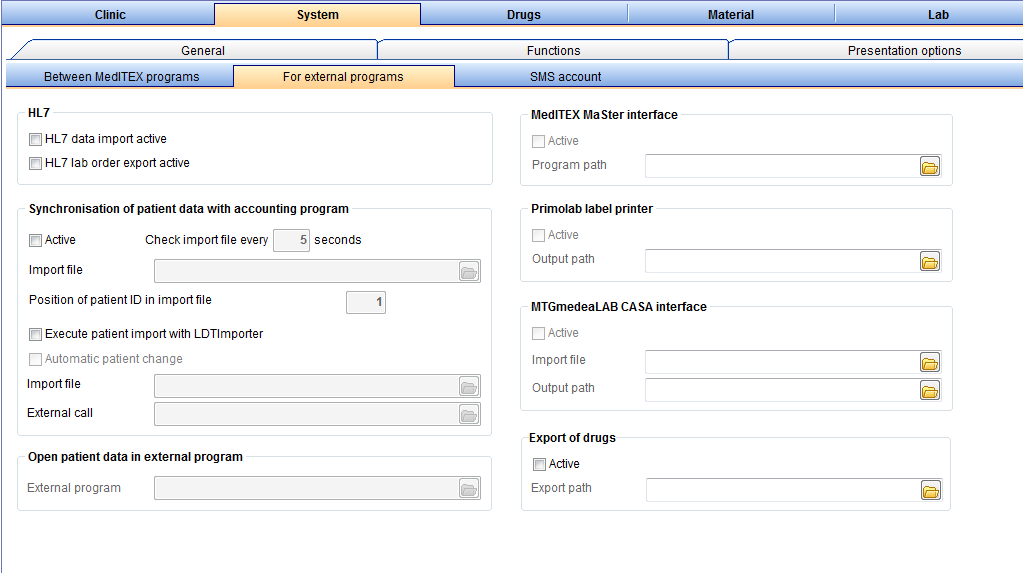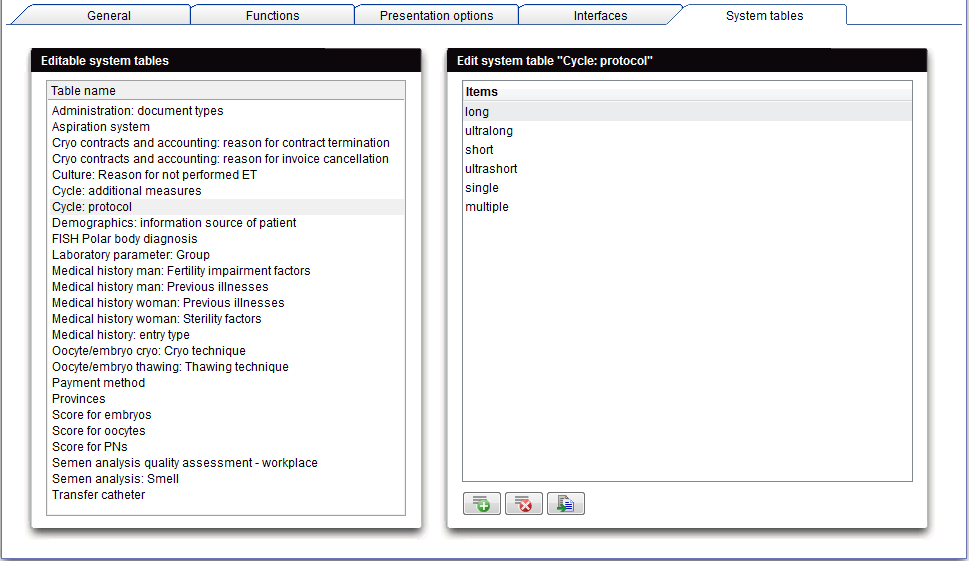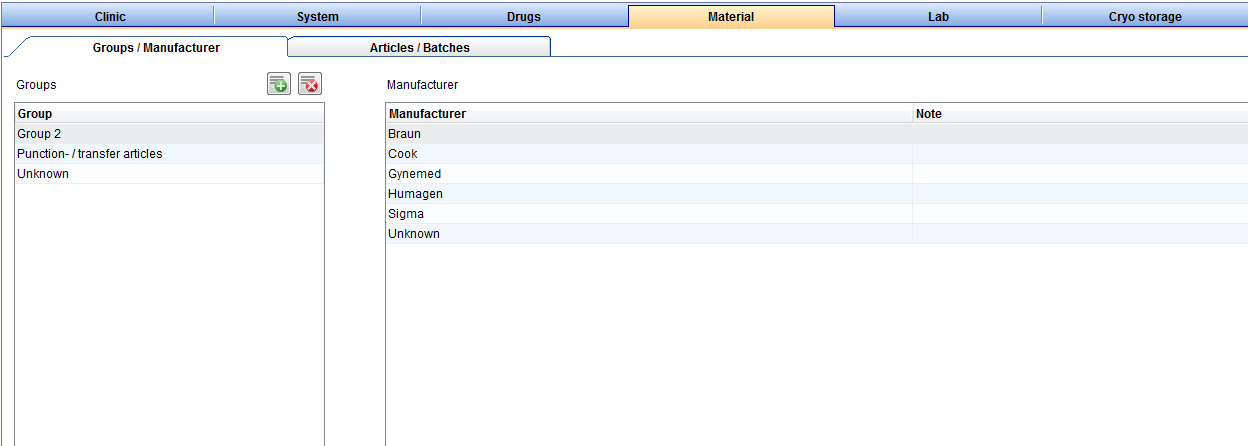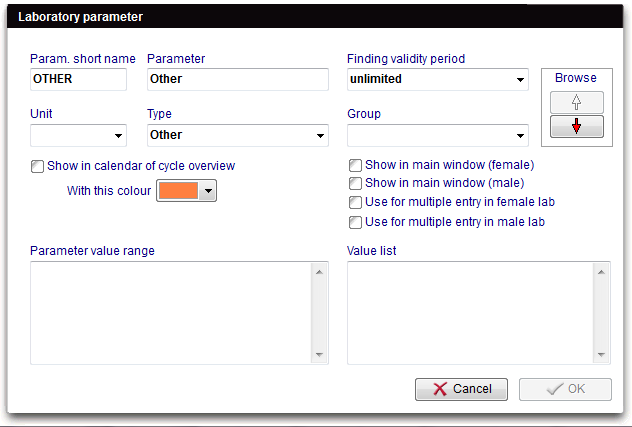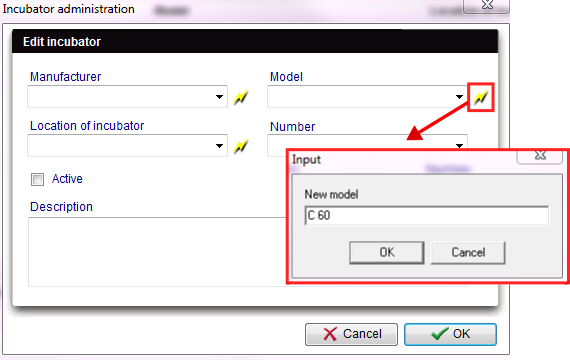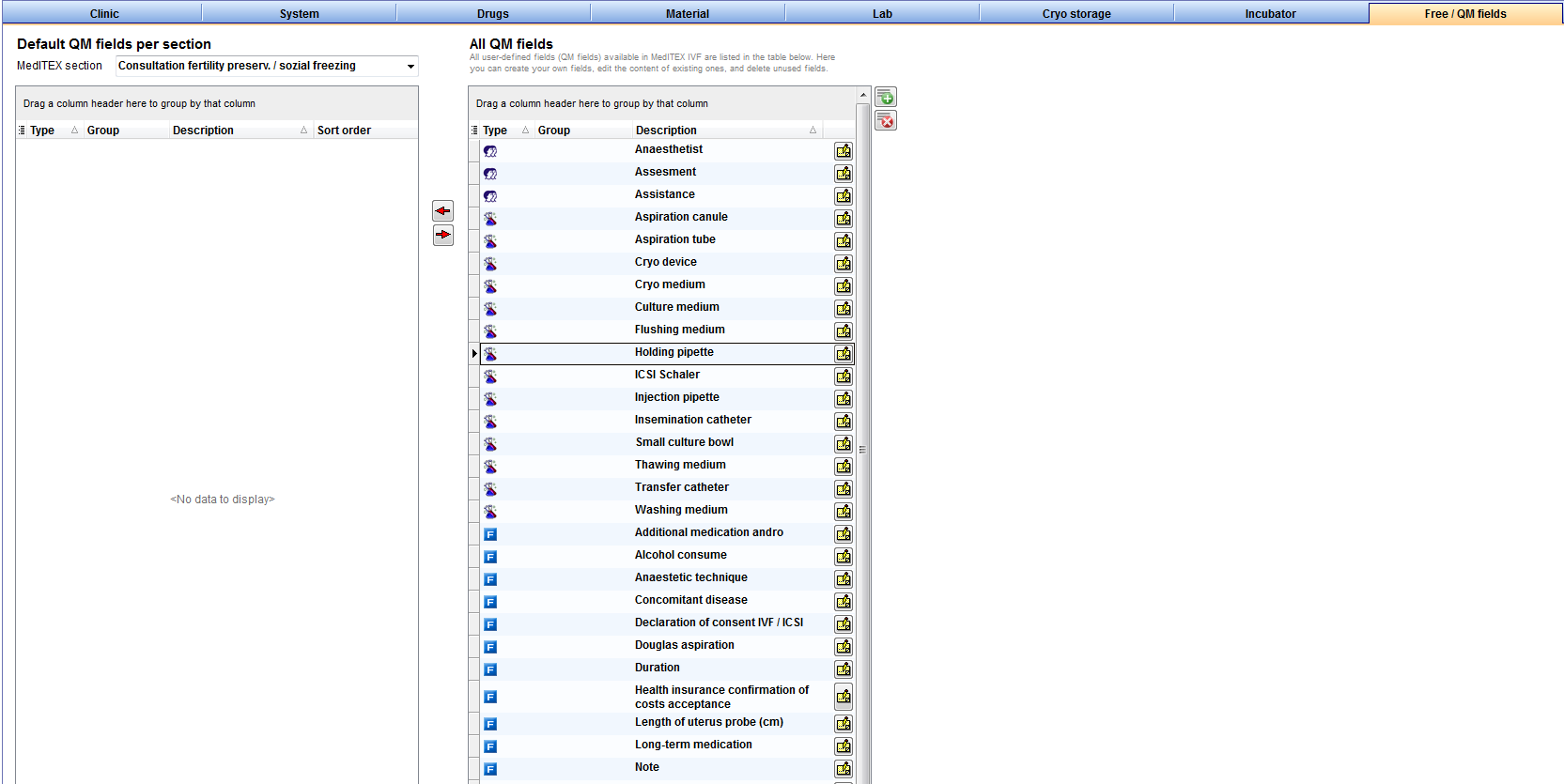MedITEX IVF Settings
From MedITEX - Wiki
Contents |
Clinic
To edit the Settings of Clinic, click on the menu item System -> Configuration -> Settings -> Clinic.
- Here you can enter the contact details about your clinic and see your clinic ID.
- Enter and edit the alias of your clinic, as well as the names of the main clinican and other data.
- If there are several clinics, you can switch with the "location" button between them.
- The disabled areas are filled by MedITEX. If you wish to change, please contact us.
| Back to top |
System
To edit the Settings of System click on the menu item System -> Configuration -> Settings -> System.
General
- System paths: here you can define which file paths are used for the interfaces of accounting and laboratory programs, as well as the location where the program manages file storage and digital documents. In order to change file paths, click the directory symbol on the right side of the respective row. A dialog window will open and you can change the file path accordingly.
- Update table generators: to use this function, please make sure that no one is using the program and all users are logged off the system.
- Warnings: you can set the relevant warnings for your clinic (for example “Basis list”). Warnings defined by German IVF Registry (DIR) are relevant only for clinics based in Germany.
In the area "Warnings" you can individually choose the field catalogs that are relevant to your center. MedITEX IVF can then selectively indicate erroneous entries or missing information with red warnings.
As MedITEX IVF checks data in real time, warnings are immediately shown when switching to another input mask. Deselecting the box “Show warnings immediately” can disable this option.
- Only change the warning settings if you are absolutely sure what you are doing. Otherwise, incorrect entries may go unnoticed.
| Back to top |
Functions
General
To edit the Settings of General functions click on the menu item System -> Configuration -> Settings -> System -> Functions -> General.
 |
Generate patient ID automatically
|
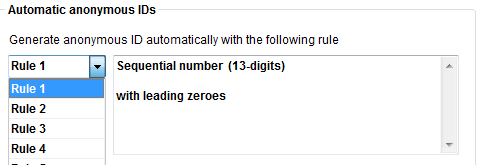 |
Automatic anonymous IDs
|
 |
Logging of data changes
|
 |
Screenshot functionality / notebook
|
| |
Show extern documents
|
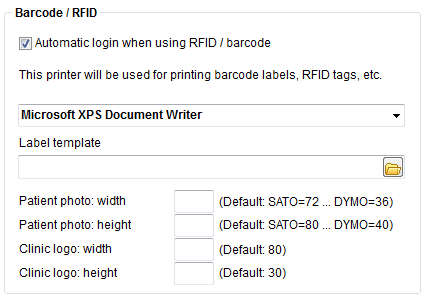 |
Barcode / RFID
|
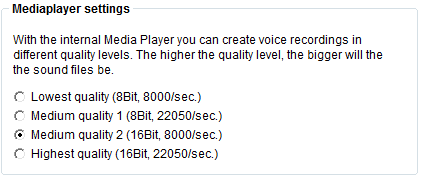 |
Mediaplayer settings
|
| Back to top |
Report editor
This section describes the settings of Report editor. If you want to get more information about the queries, click here.
To edit the Settings of Report editor click on the menu item System -> Configuration -> Settings -> System -> Functions -> Report editor.
- Letter templates: Here you can define the properties of your logo for letter templates, with: Name, Picture, Height and Width.
- Locations: If your center operates at multiple places, you can create custom templates for each location. Move with the arrow keys between the individual centers.
- Graphic requirements for additional placeholders: Define here, the size of the oocyte- / ultrasound pictures used in your letters and how many pictures can be shown in one row. By doing so, you will always have an identical and clear typeface.
- Word modul settings: Create a submission of your letter and save it here for using.
- Administrate letters:
Activate this field for editing the values A + B in one field. This button takes you to the configuration of the letters. Click on it to get more information.
| Back to top |
Semen analysis
To edit the Settings of Semen analysis click on the menu item System -> Configuration -> Settings -> System -> Functions -> Semen analysis.
-
Use WHO [A+B]: German user can not activate this field. Because the german IVF register demands both values separately.
- Double witnessing:
- Quarantine period for cryo preserved donor sperm: Set here the days for the quarantine period for cryopreserved donor sperm. Donor sperm, in which a laboratory value of HEP B, HEP C, TPHA, HIV is positive, or those that have not yet reached the quarantine period can not be thawed or used.
| Back to top |
Cycle
To edit the Settings of Cycle click on the menu item System -> Configuration -> Settings -> System -> Functions -> Cycle.
- Culture: Activate here the automatic calculation of score and score average in the graphical representation of culture at the cycle.
- Pregnancy: For the automatic calculation of the indicated gestational weeks in the program, you can choose 40 or 38 weeks.
- Transfer: The maximum number of embryos per transfer is set here. Observe the legal requirements of your country.
| Back to top |
Cryo contracts and accounting
To edit the Settings of Cryo contracts and accounting click on the menu item System -> Configuration -> Settings -> System -> Functions -> Cryo contracts and accounting.
|
Activate cryo contracts and accounting. By default, this option is checked. It enables the creation of cryo contracts and invoices for a patient. If this option is unchecked, all contract and invoice functionalities will be disabled throughout the program. |
|
- Automatically create contract number: If this option is checked, it will apply a predefined rule to generate a number once every cryo contract is created.
-
Contract types: An Overview list of possible types of contracts your clinic. With the "Plus" button, you can add a new type of contract. Do this by specifying the name, frequency and amount in the new window. Also, here you can set whether a contract as a "standard template" is used, and whether a contract is "active", i.e. currently in use. To edit an existing contract, double-click on the desired line. Deleting a contract is only possible if it is not used.
- Edit contract template: Opens MS Word to enable creation and editing of the template used for cryo contracts. Change only the content of the letters. Never the gray colored bookmarks. The program requires them, for the correct data transfer.
-
Automatically create invoice number: If this option is checked, it will apply a predefined rule to generate a number once every invoice is created.
Actions and document templates:
- Invoice: the first invoice created.
- Dunning level 1: first document emitted if payment for the invoice has not been done.
- Dunning level 2: second document emitted if payment for the invoice has not been done.
- Dunning level 3: third and final document emitted if payment for the invoice has not been done.
- Description: describes the content of the document. This information appears when navigating through Administration of documents for a patient.
- Action: describes what action is taken when creating the document. This information appears when navigating through Outstanding invoices and on individual invoices for a patient.
- Word templates: option to create and edit template of documents. A few options are available when licking the Edit button: Create new document prompts for a Template name and opens MSWord so it is possible to create a brand new document. To edit, delete or rename an existing template, select the desired template and choose one of the options.
- Automatically create invoice title: Sets the name for the created invoice according to the information provided by this setting. If this option is unchecked, when creating a new invoice, no name will be automatically created, although it will still be possible to click on the auto generate button or enter the desired name. If (from month / year – until month / year) is checked, it also includes month and year to the name.
-
Standard format for invoice: Choose a default format for your invoices.
-
Reaction period: The amount of days the patient has to pay the invoice.
| Back to top |
Donation / surrogate motherhood
To edit the Settings of Donation / surrogate motherhood click on the menu item System -> Configuration -> Settings -> System -> Functions -> Donation / surrogate motherhood.
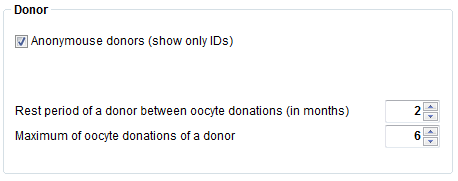 |
Donor. If this box is checked you see instead the donors only an anonymous ID. Furthermore can specify here how long rest period of a oocyte donor between the donations and how many oocytes can be donated at one intervention. |
|
Contact letter. "Create / cusomize template". Create or edit the template for your contact letter. Click the button to open it. "Edit SQL". If you have permission, you can press this button to edit the SQL. |
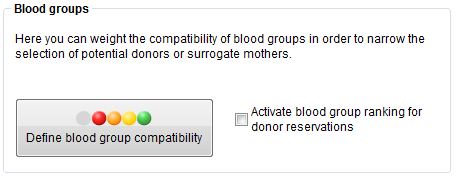 |
|
|
Blood groups ranking for donor reservations. Activate here the blood group ranking for donor reservations. If you link a donor you can see how good are the agreement of the blood groups. |
|
 |
Define blood group compatibility. With this button, you can choose the compatibilities of blood groups. The following window will be opened. |
 |
Weight of compatibility. Choose the weight of the compatibility with the colours. Sie können eine Beschreibung über die Farben im Detail finden Sie an der Spitze dieser Gegend. |
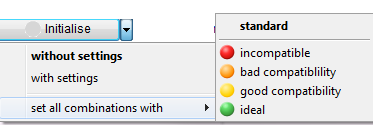 |
"Initialise". With this button you can initialise the table settings. "Without settings" connotes an empty table. "With settings" represented the diagonal set green points. "Set all combinations with" means, fill the whole table with your chosen colour. "Standard" symbolized filling the table with "good compatibility". |
|
Mirror modifications automatically. Mirror modifications means to automatically reflect the set points on the diagonal of the table. |
|
| Back to top |
Presentation options
General
To edit the Settings of General presentation options click on the menu item System -> Configuration -> Settings -> System -> Presentation options -> General.
- Window settings: Here you can set whether the view of the main window (height, width, position) to be stored per user and should be resorted at the next login.
- Cycle: Make here the settings on the view of their calendar.
-
Culture: Under culture you can choose your columns at the graphical representation.
You can set the sorting of oocytes and embryos in graphical representation of the culture mask. You can choose between sorting according to quality (the best first) or according to the relative oocyte ID.
Let you show the original treatment of the thawed PNs and embryos in the graph view.
| Back to top |
Statistics
To edit the Settings of Statistics click on the menu item System -> Configuration -> Settings -> System -> Presentation options -> Statistics.
|
In the section “Statistics”, you can determine how your charts will be displayed in the reports. By doing so, your reports will always be consistent. |
| Back to top |
Colours
To edit the Settings of Colours click on the menu item System -> Configuration -> Settings -> System -> Presentation options -> Colours.
You can use colors in the different sections of MedITEX IVF, for example in the section "Cryo storage".
| |
 |
Press “Add color" to define a new color. |
 |
Choose a colour. In the next window you can choose a color and scroll through the entire color palette. If you wish to use standardized color values, you can enter RGB values numerically. The currently selected color will be shown in a small preview window. Click "OK" and the color will be displayed in the list on the left side. The color code of your operating system will be used for the standard description of the color. To change the description, click it and enter your text next to the color. |
| Tick if you wish to use custom colors only. | |
| Select a line in the left list and click on "Delete Colour". |
| Back to top |
Interfaces
Only change the interface settings if you are sure in the changes you want to make. Otherwise there may be functionality errors or complete failure of certain functions.
Internal
To edit the Settings of Internal interfaces click on the menu item System -> Configuration -> Settings -> System -> Interfaces -> Internal.
| In order to change file paths, click the directory symbol on the right side of the respective row. A dialog window will open in which you can change the file path accordingly. |
| Back to top |
External
To edit the Settings of Externall interfaces click on the menu item System -> Configuration -> Settings -> System -> Interfaces -> External.
| |
|
Include on this page the path for the data import or export of Data of different programs. In order to change file paths, click the directory symbol on the right side of the respective row. A dialog window will open in which you can change the file path accordingly. |
| Back to top |
System tables
To edit the Settings of System tables click on the menu item System -> Configuration -> Settings -> System -> System tables.
In the section “System tables” you can modify different values within the program according to your wishes. You can, for example, define additional measures for a therapy. These can then be shown as a selection field in the therapy.
| |
|
Press “New entry” and enter the additional measure. |
|
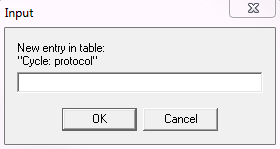 |
Confirm your entry by pressing "OK". The new additional measures will then be displayed in the window on the right and (for example) in the cycle window.
|
|
You can edit or delete the contents of the tables at any time. However, the predefined entries cannot be edited or deleted. |
| Back to top |
Staff
To edit the Settings of Staff click on the menu item System -> Configuration -> Settings -> Staff.
| Back to top |
Drugs
To edit the Settings of Drugs click on the menu item System -> Configuration -> Settings -> Drugs.
The section “Drugs” contains a fixed list of the most important products which are used in the field of reproductive medicine.
Besides this, you can also define additional long-term and pill products that are used in your medical center.
|
New drug: Add a new drug. Read more about adding new drugs, here. |
|
|
Delete drug: Only drugs you have added yourself can be deleted by pressing this button. |
- The list of drugs contains products in the groups Gonadotropin, GnRH Analogon, hCG, Progesterone, Gestagen, Estrogen, Antiestrogen and Pill according to the current Red List®
- The list of drugs is provided and updated by CRITEX and cannot be changed by the user.
- If you do not wish to use this drug, untick the box "Active". To do so, double-click on the drug to open the drug editor. There you can untick the "Active" box. Then the drug will not be shown in any selection window of the program.
- Press the column header to sort the entries according to their names, to reverse the sorting or to filter the list.
| Back to top |
Material
To edit the Settings of Material click on the menu item System -> Configuration -> Settings -> Material.
In the section “Material” you can enter data concerning material groups, manufacturers and products. You can also create different batches and "activate" them for a certain period of time.
Articles / Batches
To edit the Settings of Articles / Batches click on the menu item System -> Configuration -> Settings -> Material -> Articles / Batches.
At this tab you can add the needed materials to the list and make them available for the creation of QM fields.
| Press this button on the top right to add a new article. | |
|
Delete it with this button. This is only possible if articles have not been assigned to QM fields or used otherwise. Should this be the case, deactivate the item by unticking the box "Active". This data will then be hidden without being deleted. Articles can only be deleted if they have not yet been used. |
Get more informations about the usability, here.
Manufacturer
To edit the Settings of Manufacturer click on the menu item System -> Configuration -> Settings -> Material -> Manufacturer.
You can see a list of all existing manufactures at the tab “Manufacturer”.
| Press this button on the top right to add a new manufacturer. | |
|
Delete it with this button. This is only possible if manufactures have not been assigned to QM fields or used otherwise. Should this be the case, deactivate the item by unticking the box "Active". This data will then be hidden without being deleted. Manufacturers can only be deleted if they have not yet been used. |
Get more informations about the usability, here.
Groups
To edit the Settings of Groups click on the menu item System -> Configuration -> Settings -> Material -> Groups.
At this tab you can create a new material group, for example probes. Here you can see a list of all existing groups.
| Press this button on the top right to create a new group. | |
|
Delete a group with this button. This is only possible if groups have not been assigned to QM fields or used otherwise. Should this be the case, deactivate the item by unticking the box "Active". This data will then be hidden without being deleted. Groups can only be deleted if they have not yet been used. |
Get more informations about the usability, here.
| Back to top |
Lab
To edit the Settings of Lab click on the menu item System -> Configuration -> Settings -> Lab.
Explanation of the columns:
- Area: Type of the lab value like Hormones, Serology, Clinical chemistry, Genetics or Microbiology.
- Group: Defines the groups of laboratory values as Blood count, Coagulation, Genotype, Family history, etc.
- Param. short name: Abbreviation of the parameter name.
- Parameter name: Full name of the parameter.
- Unit: Value specified unit. This can be customized in the laboratory parameter editor.
- Reference unit: Through the button "Restore reference units" all changed parameters units are adjusted to the value of the reference units.
- Show in main window: If this box is checked, the laboratory value is displayed in the "Lab test" in the main window.
- Show in cycle overview: If this box is checked, the laboratory value is displayed in the cycle overview.
- Use for multiple entry in female lab: When activating this field, the parameter appears in the list of female multiple entry.
- Use for multiple entry in male lab: When activating this field, the parameter appears in the list of male multiple entry.
- Finding valitidy period: Decide here on the findings validity of the selected parameters.
| Press this button on the top right to add a new laboratory value. | |
| Delete a existing laboratory value with this button. | |
| Through this button all changed parameters units are adjusted to the value of the reference units. |
Adding or editing a laboratory parameter
With a double click on one line, the laboratory parameter editor will be opened for editing the parameter.
Here you can add or change the descriptions of your laboratory parameters. Some fields are free for entering data, others are either only for the displaying of informations in other windows or for selecting via a drop down list.
| Back to top |
Cryo storage
To edit the Settings of Cryo storage click on the menu item System -> Configuration -> Settings -> Cryo storage.
In the section “Cryo storage” you can manage all cryo canisters and their storage system. You can define up to three hierarchic storage levels per canister. Their filling level can be checked in the freezing section to determine free space.
|
Press this button to add a new unit. More information about adding a new unit read here. |
|
| Select the unit you wish to delete and click this button. |
|
| Save your changes. | |
 |
Freeze with cryo storage: You can choose which "type" you will freeze in your cryostorage: female or male, or both. |
Storage dimensioning:
- When a new unit will be created, the following fields have to be filled:
- Description
- Type
- Storage levels
- Type: You can also determine whether oocytes and embryos ("Ooc./emb.") or sperms (“Andro”) will be stored in a unit.
- It is possible to modify the name of the allocation units. Select an existing unit by clicking on it in the column "Allocation unit" and edit name, type and storage level accordingly.
| Back to top |
Incubator
To edit the Settings of Incubator click on the menu item System -> Configuration -> Settings -> Incubator -> Incubator.
Incubator administration:
- Active: Here you can see whether the incubator is set to "Active". This setting can be set in the edit window.
- Manufacturer: Registered Manufacturer of the incubator.
- Model: Model / Type of the incubator.
- Location of incubator: The place at which the incubator is used.
- Description: Descriptions for special or specific notes about the incubator.
- Incubator no: Enter a number to each incubator in order to distinguish them better and faster.
Incubator documents:
You can see the documents of an selected incubator.
- Date: Creation date of the document.
- Description: Short description with important information.
- Filename: Name of the stored protocol.
- Protocol: Stored notes.
Adding or editing an incubator:
With a double click on one row, the incubator editor will be opened.
| Add a new incubator with the flash-button. After adding, you can choose it from the drop-down-list. |
All that is viewed or edited in the tab "Incubator" can be done in the separate tabs:
- Location of incubator
- Model
- Manufacturer
| Back to top |
Free / QM fields
To edit the Settings of Free / QM fields click on the menu item System -> Configuration -> Settings -> Free / QM fields.
- Here you can configure all QM and free fields. QM, quality management, stands for the option to document all the information relevant to you with the help of QM fields.
- Staff, material, times and further free fields can be assigned to any QM field – and therefore every associated input area - in the settings.
Some buttons have special functionalities. Click on it to have more information.
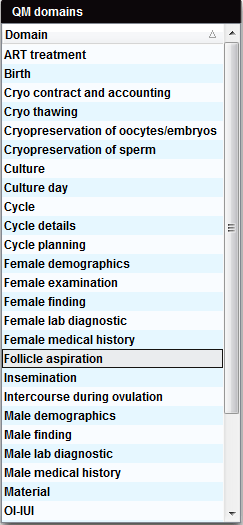 |
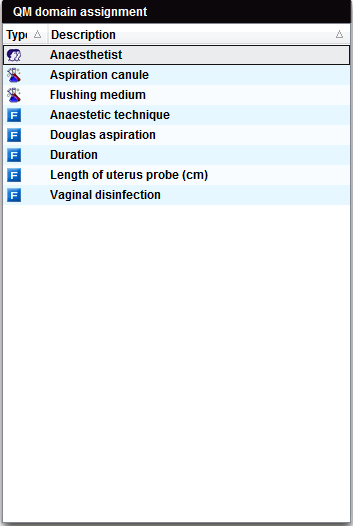 |
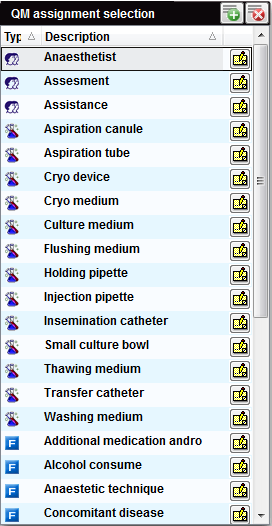 |
|
QM fields: A list of all QM fields in MedITEX IVF. The number and description of QM fields can not be changed by the user. In the example the field "Follicle aspiration" is selected. |
Items assigned to the selected QM field: In this column you can see all items assigned to the selected QM field (Follicle aspiration). The entries are separeted in the three types, which are represented as symbols.
|
Pool of all available items: This column displas all positions that have allready been defined for all QM domains (QM fields). They represent a "pool" whose items can be assigned flexibly.
|
Press the column header to sort the items by their names, type or description.
There are a number of options to edit the items assigned to a QM field. Read more about
- defining and adding new items,
- adding new items from the list "QM assignment selection",
- item cofiguration,
- and deleting in the How to.
Tips for managing QM fields:
- Access to settings and the possibility to modify the program should only be given to the MedITEX Administrator/Representative.
- Try to avoid the frequent adding and removing of items in the column "QM assignment selection". Instead, try to create a logical system in which existing items can be modified in the column "QM assignment selection" (for example modifying of material and staff).
- Update the QM settings regularly.
- Deleting items in the column „QM assignment selection“ can be risky. Try to avoid this and instead only remove assigned items from the column “QM domain assignment” (right arrow between columns).
- You do not have to define times in the settings. After pressing the QM fields in the program, you can determine a start and end time.
- You do not have to define comments in the settings. After pressing the QM fields in the program, you can add a comment to all items.
- Not matter if staff, material or free field: You can add staff and a list of values to any item. Combine material and staff in one entry.
| Back to the MedITEX IVF menu | Back to top |

